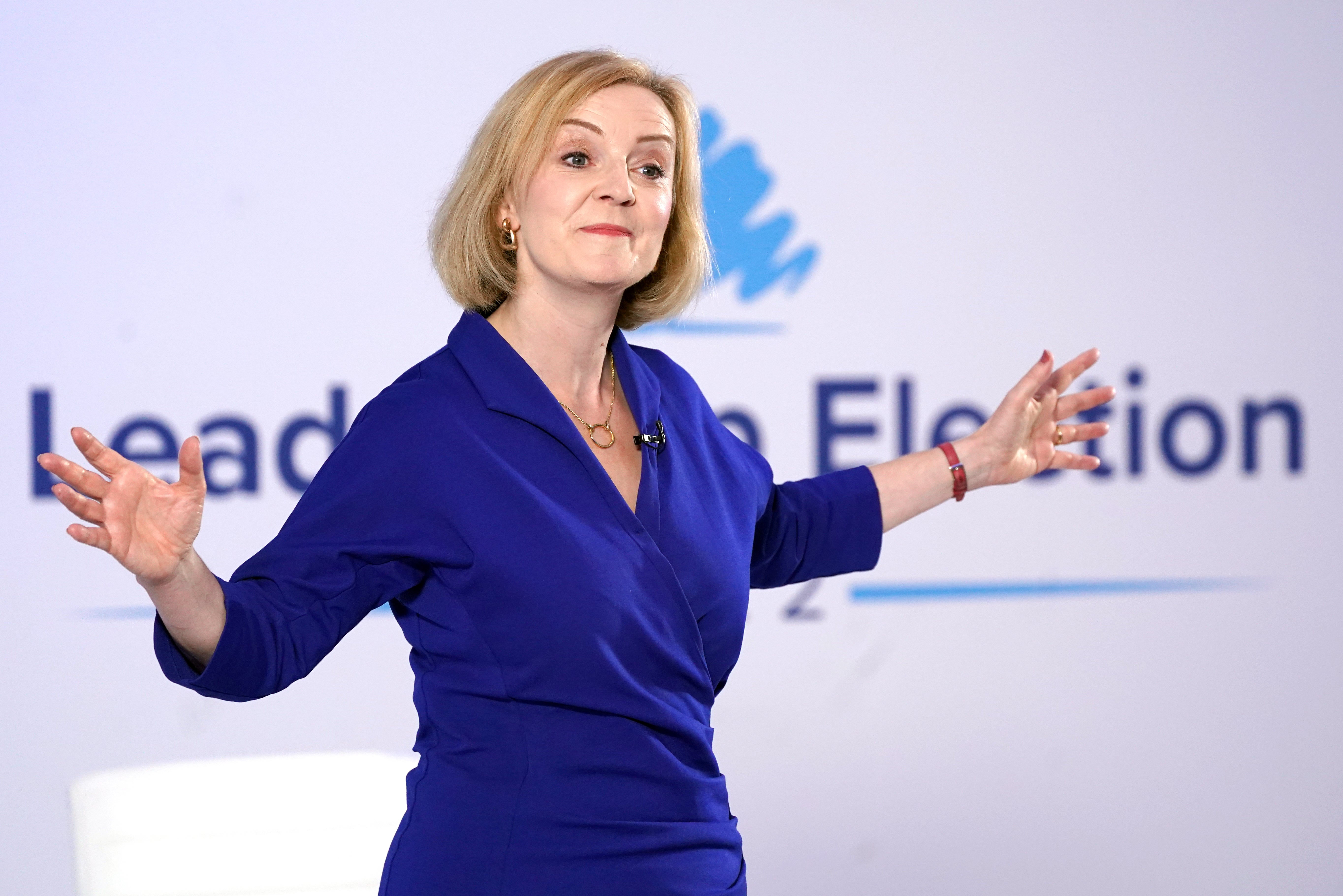The financial markets are quite right to be afraid of Trussonomics
Borrowing costs have surged amid expectations for a sharp rise in interest rates but the pound has been sliding, writes James Moore


Throughout the course of her dismal campaign for the leadership of the Tory party, Liz Truss has studiously avoided economic reality, notably ducking interviews with people who might confront her with it (Nick Robinson and especially Andrew Neil).
That reality, however, is starting to bite.
Her (likely losing) rival Rishi Sunak warned of the danger of the markets losing faith in Britain in an interview with the Financial Times. It might serve as his last hurrah. Perhaps he hopes to establish himself as the (possible) king in waiting on the backbenches. The man to pick up the pieces when it all goes horribly wrong.
The former chancellor said it would be “complacent and irresponsible” to ignore the risks of a loss of confidence in the UK economy. The risks? Look around, Mr Sunak. It’s already happening. UK borrowing costs have surged as investors bet on sharply higher interest rates. Far from getting a boost from this, the pound has been on the slide against the dollar and the euro.
“He’s right. Markets are concerned about the UK’s exposure to gas but also worried about economic policy,” one economist told me.
Interestingly, that economist saw a similarity with the situation in March 2020, when sterling was even lower and the world was looking on aghast as the UK was full of suggestions of “herd immunity” in response to the pre-vaccine pandemic. The country’s belated entry into lockdown (which came at its own cost) sent it back up.
Set against that, it is, I suppose, just possible that Truss – assuming she wins – enters Downing Street and ignores some of the things she has been talking about on the campaign trail. But the names being floated for a Truss government’s economic portfolios don’t inspire much confidence. The doctrinaire ideologues and/or “yes” men and women who will have delivered her the prize look set to enjoy their reward. The country looks set to pay a price for that. It could get very messy, very quickly.
As another economist pointed out to me, it is not always the worst thing to challenge the markets’ assumptions. They don’t always get it right. They don’t always behave logically. What they want isn’t always what is in the best interests of the country, especially at a time like this when ordinary people are enduring considerable privations with worse on the way. Potentially much worse.
But splurging billions of pounds on unfunded tax cuts for the richer sections of society isn’t in the best interests of the country either. And don’t let us forget the public services people rely on, public services which are on their knees. People are starting to notice that.
I could be wrong, but there doesn’t appear to be boundless enthusiasm for “rolling back the state” in this country that the Tory right imagines. On the contrary. More often you’ll find a sense of horror when people visit their local hospitals or consider the state of their children’s schools.
This morning, the Resolution Foundation releases a report forecasting that real household disposable incomes will fall by 10 per cent over this year and next. That represents the deepest decline in a century, which is quite something when you consider the various economic shocks, not to mention wars, which have happened over the last 100 years. The number of people living in absolute poverty is, meanwhile, set to rise by 3 million. This will have real economic consequences, as well as social ones. Truss seems to be blind to both.
The British Retail Consortium has meanwhile reported a 9.3 per cent surge in food prices, the highest since 2008. It’s energy which has grabbed all the attention, and with good reason, given the way Ofgem’s price cap has been behaving. It’s debatable that “cap” is even the right word for it.
But the way food prices have been going should be of equal concern. There are already a substantial number of people in, or close to being in, poverty. Many of them are on fixed incomes. Any inflation is a blight on the lives, much less 9 per cent plus. Hidden within these figures are a million tales of misery.
Confronted with them, Truss’s stock response seems to be to stick her fingers in her ears and sing “la la la”.
It is deeply troubling that this has worked for her so far. It is going to deliver her to Downing Street, where she’ll be able to enjoy Boris and Carrie’s overpriced wallpaper.
A performance like hers is quite staggering from someone who aspires to be a national leader. It simply cannot work forever.
The economic furies are lining up to take their vengeance on a government that has ignored them for too long. No wonder the markets are running scared. Applying Trussonomics to them is like driving a Porsche at top speed into a multi-car motorway pile-up.
Join our commenting forum
Join thought-provoking conversations, follow other Independent readers and see their replies
Comments
Bookmark popover
Removed from bookmarks